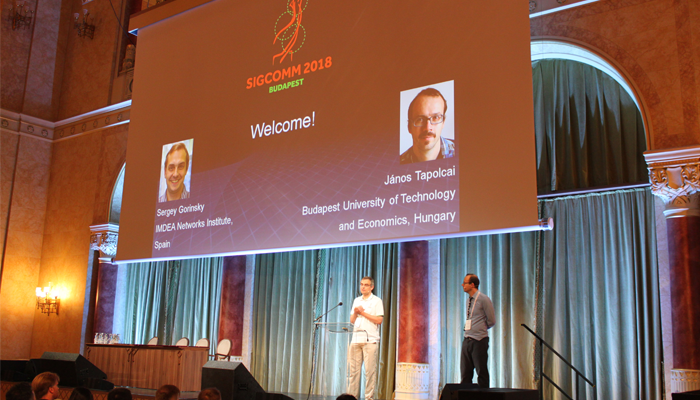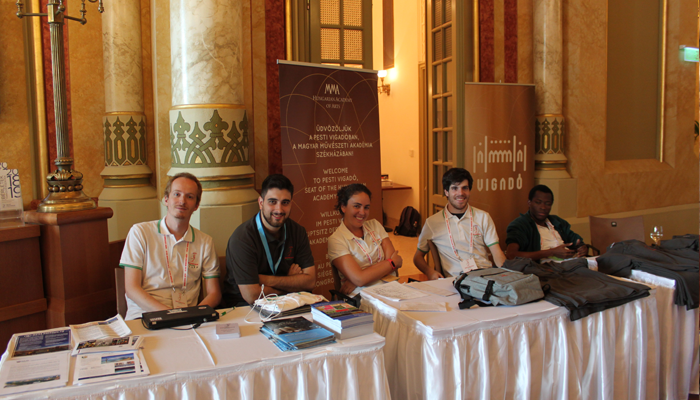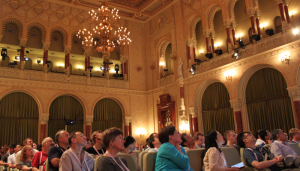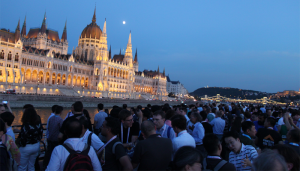IMDEA Networks

IMDEA Networks excels in ACM SIGCOMM 2018 organization
ACM SIGCOMM is the leading venue on architectures, protocols, technologies, and applications of computer networking and data communication
26 October 2018

ACM SIGCOMM 2018 met in Budapest on August 20-25. The first visit to Eastern Europe became an unqualified success for the flagship annual conference of the ACM Special Interest Group (SIG) on Data Communication. Encompassing a variety of traditional and newly introduced events, the six-day conference program attracted about 200 more attendees than expected.
SIGCOMM 2018 received around 750 registrations overall, with about 700 people registered for the 3-day main conference. The conference hosted 12 workshops and 6 tutorials, involving about 500 participants in total over the 2 dedicated days of the program.
The NetAI (Network Meets AI & ML) workshop alone received 108 registrations, enough to be a conference by itself. The ERC Networking symposium, a special full-day workshop consisting exclusively of invited talks by ERC grant holders, also attracted strong participation and was broadly perceived as a successful experiment. On its last day, the conference hosted an inaugural SIGCOMM hackathon. Cisco, Facebook, Ericsson, Alibaba, Google, Huawei, Amazon, Microsoft, Akamai, Comcast, NetApp, Nokia, Verizon, VMware, and Netflix supported the conference financially.
The revenues of SIGCOMM 2018 exceeded half a million Euros and enabled the organizers to provide the attendees with highly memorable experiences, such as the welcome reception held during spectacular national-holiday fireworks, main conference in the splendid (and historically important) Vigadó Concert Hall, and banquet as a cruise on the Danube. Appreciating the meticulous organization, the attendees provided overwhelmingly positive feedback and abundantly expressed their gratitude both verbally and in writing. A number of participants claimed that the conference was the best SIGCOMM ever.

A group of IMDEA Networks PhD Students at work during the conference.
Faculty, students, and alumni of IMDEA Networks Institute greatly contributed to the successful ACM SIGCOMM 2018 organization. Research associate professor Sergey Gorinsky served as a General Chair of the conference, acted as the main contact point for the SIG and ACM, and played a leading role in developing and directly managing almost all the aspects of the SIGCOMM 2018 organization. Research professor Antonio Fernandez Anta and alumnus Ignacio Castro chaired Travel Grants and Publicity respectively. Research assistant professor Kirill Kogan and alumna Andra Lutu served respectively on the Juries of the Student Research Competition and Hackathon. PhD students Hany Assasa, Guillermo Bielsa, Álvaro Feal, Julien Gamba, Vadim Kirilin, Oluwasegun Ojo, Noelia Pérez Palma, and Pelayo Vallina-Rodríguez helped to run the conference on site from early morning till late at night. Research professors Joerg Widmer and Antonio Fernandez Anta, research assistant professors Narseo Vallina-Rodriguez and Kirill Kogan, PhD students Pavel Chuprikov and Vitalii Demianiuk, and incoming IMDEA Networks visitors Suman Banerjee and Deepak Ganesan also participated in the conference. Joerg Widmer’ contributed to SIGCOMM 2018 by giving an invited talk and servicing on the discussion panel of the ERC Networking symposium.
ACM SIGCOMM is widely considered the leading venue on architectures, protocols, technologies, and applications of computer networking and data communication. The conference spans all aspects of networks and networked systems, including packet processing, hardware and software, virtualization, mobility, sensors, energy consumption, novel applications of artificial intelligence to networking, and usability of underlying networking technologies. Its participants include distinguished academics, brilliant students, and representatives of major multinational companies. Centered on its highly selective main conference, SIGCOMM published many landmark works in networking and communications. The conference also involves workshops, tutorials, presentation of demos, posters, industrial demos, student research competition, topic previews, and mentoring sessions.
- The main conference being held in the Vigadó Concert Hall
- The banquet cruising the Danube




Recent Comments